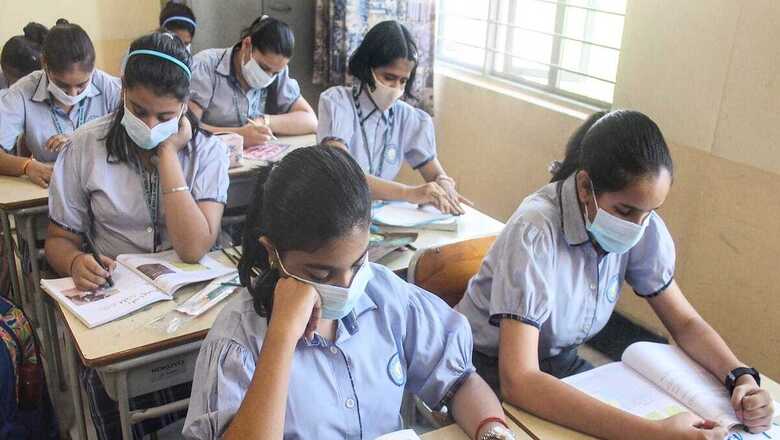
views
Half of infants and children visiting hospitals in Delhi-NCR are suffering from persistent cough, breathing difficulties, weak immunity and viral infections due to worsening air pollution, several doctors told News18.
Children who suffer from asthma or other respiratory illnesses and are prone to allergic reactions are at a higher risk and form a majority of patients in the emergency departments and outpatient departments (OPDs). Doctors, however, are seeing several first-timers, which comprise young children as well as infants.
While young children are complaining of respiratory problems starting with rhinitis, nasal stuffiness and sinusitis, infants who have low birth rates are vulnerable to respiratory distress, breathing issues and restlessness.
Doctors have observed that cough syrups are showing a slowed response, and as a result, children and infants are requiring higher doses of medication – a trend similar to adults suffering due to air pollution.
“Headache is very common among children. These children will come to us with watering of the eyes, breathing difficulty where they can’t even speak due to hard-to-control cough… this cough doesn’t go at all,” Sandeep Nayar, head of department, chest and respiratory diseases, BLK-Max Super Speciality Hospital told News18.
Several other doctors similar to Nayar told News18 how children and infants in Delhi-NCR are falling ill due to concerning air quality index and its impact on their overall well-being.
‘Three to Five Suffer Due to Toxic Air’
According to Dr Vivek Nangia, head of pulmonology, Max Super Speciality Hospital in Saket, around five out of every 10 patients are coming in OPD with complaints triggered by air pollution in the last fortnight.
Top symptoms include watery eyes, runny nose, cold, cough, foreign body sensation in the throat, breathlessness and wheezing.
“Patients coming with respiratory issues have increased by at least 20% and blame goes to air pollution along with other factors,” Dr Nangia said. Not only children but the trend is bothering newborn babies and infants as well.
Dr Raghuram Mallaiah, senior director, neonatology at Fortis La Femme, told News18 that out of every 10 patients, three to four are suffering directly or indirectly due to air pollution.
“Many babies are coming to OPDs with breathing issues, persistent cough and other respiratory problems. Smaller proportions (of people) are also coming with wheezing issues,” Mallaiah said while adding that air pollution leads to a lowering of the body’s immunity thus making children susceptible to other viral and bacterial illnesses.
How Pollution is Impacting Children
The first visible and concerning impact of toxic air is the increasing requirement of medications on children’s weak and fragile bodies.
Sample this: Dr Kuldeep Kumar Grover, head of critical care and pulmonology at CK Birla Hospital in Gurugram, said that “the most common complaint in the younger children coming to us is that they have a persistent cough and no cough syrup seems to be working on their child.”
These are commonly known as upper respiratory tract infections which are normally viral in nature, he said while warning that if they are not getting treated well on time it will lead to bronchitis and lower respiratory features in the coming months.
Also, experts highlighted that frequent illnesses due to air pollution hamper the normal growth of children. Nangia from Max quoted the study done by comparing the lung functions of children in Delhi schools versus those of children in Kerala’s Kottayam and Karnataka’s Mysuru. The study found that lung functions were poorer in children from Delhi.
It showed that more than 50% of adolescents in Delhi have a higher incidence of chest symptoms, and 29% have asthma.
“A number of epidemiological studies have proven that air pollution from traffic causes cancer, particularly leukaemia, in children,” he said.
Studies have also linked air pollution with neurobehavioral disorders. The term refers to a range of conditions linked to behavioural difficulties that often accompany conditions such as brain diseases, traumatic injuries, and acquired brain damage.
Why Children are Vulnerable
Nayar from BLK-Max Super Speciality Hospital explained that the immunity of children is weak as the “complex structure is not that well developed”.
Nayar added that another reason affecting children is their high breath rate. “Children tend to breathe more frequently and more deeply, hence, the pollution enters deep into the lower respiratory tract. Once pollution enters their body, it can transfer to the blood and any other part of the body. Hence, children are getting more and more symptomatic.
Experts explained that right from pregnancy, the children in the womb start getting affected if the mother is exposed to pollution.
There is growing evidence that this group of pollution contribute to cognitive impairment and play an important role in the development of the brain. Many of the patients who have autistic disorder maybe affected by the pollution.
How to Take Care
Doctors believe that parents need to be extra cautious and prevent children from playing outside, especially during poor and very poor AQI.
Secondly, they must refrain children from consuming cold items because that will trigger more respiratory problems. “Third and foremost is vaccination. If any vaccination schedule is pending, then we should get it done with a paediatrician,” said Grover from CK Birla Hospital.
“Most commonly respiratory problems start with rhinitis and nasal stuffiness, and sinusitis is a problem in young children. They are easily treated with steam at least two to three times a day”.
He advised that in case of sinusitis, some kind of saline spray with nasal sprays must be used. For bronchitis, nebulizers can help in relieving the cough and all other kinds of symptoms.
Overall, doctors indicated maintaining hand hygiene, ensuring proper vaccinations, eating home-cooked food and avoiding gatherings and unnecessary travel in crowded areas, especially around the festive season.



















Comments
0 comment